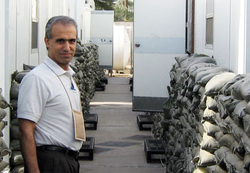About Rob Ricigliano

Ricigliano inside the Green Zone. Baghdad, Iraq.
Mr. Ricigliano is the Director of the Institute of World Affairs at the University of Wisconsin - Milwaukee, where he teaches International Mediation and Peacebuilding through the Department of Communication and is the Coordinator of the Certificate in Peace Studies and Conflict Resolution. He is also a former Executive Director of the Conflict Management Group and served as an Associate Director of the Harvard Negotiation Project at Harvard Law School.
Mr. Ricigliano’s recent work has focused on applying systems theory to developing practical tools for sustainable peacebuilding. He is working with both USAID and the Department of Defense on projects to integrate systems analysis into their assessment and planning processes. He has worked with US Interagency teams to do assessments of Cambodia (2009) and Mindanao (2010). In addition, Mr. Ricigliano has worked with officials all over the world to help resolve conflict. He has worked with political parties in the new Iraqi Parliament and has been involved in peacebuilding interventions in the Democratic Republic of Congo, Afghanistan, Cambodia, Russia, Georgia, Colombia, South Africa, and elsewhere. Mr. Ricigliano has trained diplomats and other government officials from Africa, Europe, Asia, and North America.
Rob has also written widely on negotiation and peace processes. Recent publications include the book, Making Peace Last: a toolbox for sustainable peacebuilding (November 2011) and a chapter entitled, Afghanistan:Planning for Systemic Impact (June 2011). He edited a volume of Accord entitled Choosing to Engage: armed groups and peace processes, and wrote an article, entitled A Systemic Approach to Cross-Border Peacebuilding, in another Accord volume. His writings on negotiation and peace processes include, A Three-Dimensional Model of Negotiation, Networks of Effective Action: Implementing a Holistic Approach to Peacebuilding, Cold War, Redux: A Critique of and Alternative to the War on Terrorism, and The Choardic Peace Process.
His J.D. is from the Harvard Law School and his B.A. from Hamilton College
Mr. Ricigliano’s recent work has focused on applying systems theory to developing practical tools for sustainable peacebuilding. He is working with both USAID and the Department of Defense on projects to integrate systems analysis into their assessment and planning processes. He has worked with US Interagency teams to do assessments of Cambodia (2009) and Mindanao (2010). In addition, Mr. Ricigliano has worked with officials all over the world to help resolve conflict. He has worked with political parties in the new Iraqi Parliament and has been involved in peacebuilding interventions in the Democratic Republic of Congo, Afghanistan, Cambodia, Russia, Georgia, Colombia, South Africa, and elsewhere. Mr. Ricigliano has trained diplomats and other government officials from Africa, Europe, Asia, and North America.
Rob has also written widely on negotiation and peace processes. Recent publications include the book, Making Peace Last: a toolbox for sustainable peacebuilding (November 2011) and a chapter entitled, Afghanistan:Planning for Systemic Impact (June 2011). He edited a volume of Accord entitled Choosing to Engage: armed groups and peace processes, and wrote an article, entitled A Systemic Approach to Cross-Border Peacebuilding, in another Accord volume. His writings on negotiation and peace processes include, A Three-Dimensional Model of Negotiation, Networks of Effective Action: Implementing a Holistic Approach to Peacebuilding, Cold War, Redux: A Critique of and Alternative to the War on Terrorism, and The Choardic Peace Process.
His J.D. is from the Harvard Law School and his B.A. from Hamilton College
